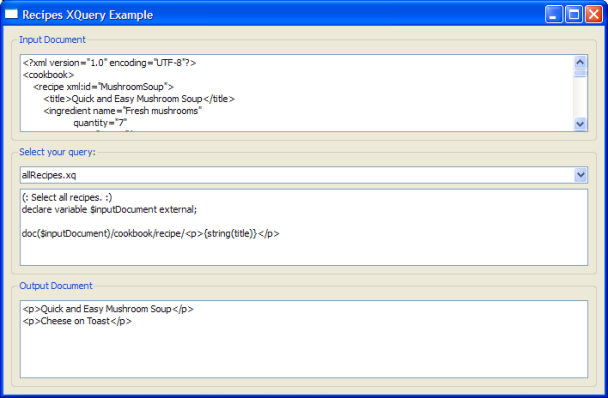The UI Class: QueryMainWindow
The example's UI is a conventional Qt GUI application inheriting QMainWindow and the class generated by Qt Designer:
class QueryMainWindow : public QMainWindow,
private Ui::QueryWidget
{
Q_OBJECT
public:
QueryMainWindow();
public slots:
void displayQuery(int index);
private:
QComboBox* ui_defaultQueries;
void evaluate(const QString &str);
void loadInputFile();
};
The constructor finds the window's combo box child widget and connects its currentIndexChanged() signal to the window's displayQuery() slot. It then calls loadInputFile() to load cookbook.xml and display its contents in the top group box's text viewer . Finally, it finds the XQuery files (.xq) and adds each one to the combo box menu.
QueryMainWindow::QueryMainWindow() : ui_defaultQueries(0)
{
setupUi(this);
new XmlSyntaxHighlighter(qFindChild<QTextEdit*>(this, "inputTextEdit")->document());
new XmlSyntaxHighlighter(qFindChild<QTextEdit*>(this, "outputTextEdit")->document());
ui_defaultQueries = qFindChild<QComboBox*>(this, "defaultQueries");
QMetaObject::connectSlotsByName(this);
connect(ui_defaultQueries, SIGNAL(currentIndexChanged(int)), SLOT(displayQuery(int)));
loadInputFile();
const QStringList queries(QDir(":/files/", "*.xq").entryList());
int len = queries.count();
for(int i = 0; i < len; ++i)
ui_defaultQueries->addItem(queries.at(i));
}
The work is done in the displayQuery() slot and the evaluate() function it calls. displayQuery() loads and displays the selected query file and passes the XQuery text to evaluate().
void QueryMainWindow::displayQuery(int index)
{
QFile queryFile(QString(":files/") + ui_defaultQueries->itemText(index));
queryFile.open(QIODevice::ReadOnly);
const QString query(QString::fromLatin1(queryFile.readAll()));
qFindChild<QTextEdit*>(this, "queryTextEdit")->setPlainText(query);
evaluate(query);
}
evaluate() demonstrates the standard QtXmlPatterns usage pattern. First, an instance of QXmlQuery is created (query). The query's bindVariable() function is then called to bind the cookbook.xml file to the XQuery variable inputDocument. After the variable is bound, setQuery() is called to pass the XQuery text to the query.
Note: setQuery() must be called after bindVariable().
Passing the XQuery to setQuery() causes QtXmlPatterns to parse the XQuery. QXmlQuery::isValid() is called to ensure that the XQuery was correctly parsed.
void QueryMainWindow::evaluate(const QString &str)
{
QFile sourceDocument;
sourceDocument.setFileName(":/files/cookbook.xml");
sourceDocument.open(QIODevice::ReadOnly);
QByteArray outArray;
QBuffer buffer(&outArray);
buffer.open(QIODevice::ReadWrite);
QXmlQuery query;
query.bindVariable("inputDocument", &sourceDocument);
query.setQuery(str);
if (!query.isValid())
return;
QXmlFormatter formatter(query, &buffer);
if (!query.evaluateTo(&formatter))
return;
buffer.close();
qFindChild<QTextEdit*>(this, "outputTextEdit")->setPlainText(QString::fromUtf8(outArray.constData()));
}
If the XQuery is valid, an instance of QXmlFormatter is created to format the query result as XML into a QBuffer. To evaluate the XQuery, an overload of evaluateTo() is called that takes a QAbstractXmlReceiver for its output (QXmlFormatter inherits QAbstractXmlReceiver). Finally, the formatted XML result is displayed in the UI's bottom text view.
Note: Each XQuery .xq file must declare the $inputDocument variable to represent the cookbook.xml document:
(: All ingredients for Mushroom Soup. :)
declare variable $inputDocument external;
doc($inputDocument)/cookbook/recipe[@xml:id = "MushroomSoup"]/ingredient/
<p>{@name, @quantity}</p>
Note: If you add add your own query.xq files, you must declare the $inputDocument and use it as shown above.























